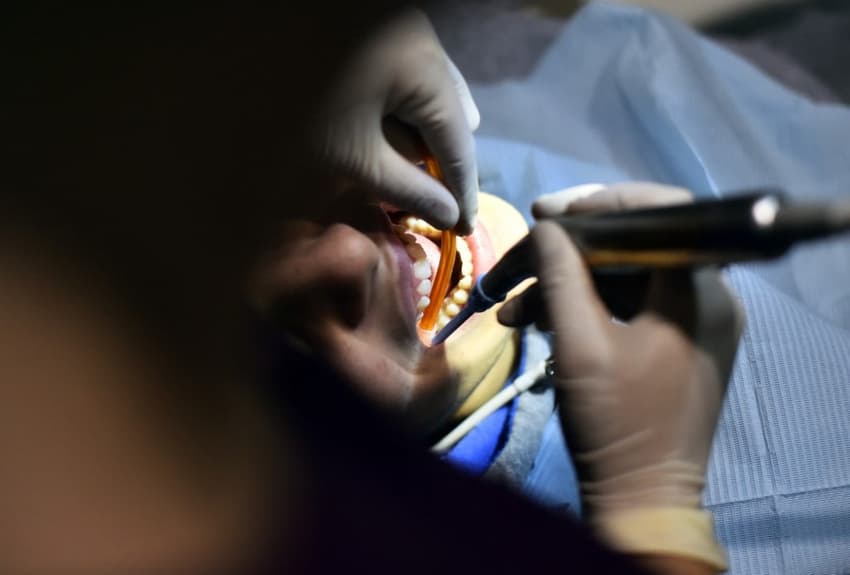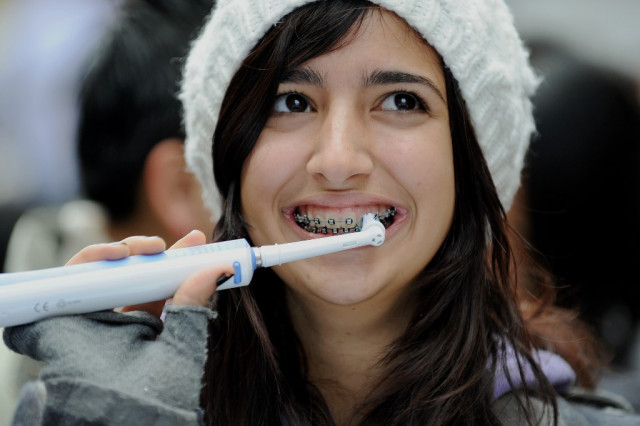The essential guide to going to the dentist in Spain

For Members: Average prices, useful vocab and other essential information you need before visiting the dentist in Spain.
Whether you’ve had a tooth emergency while on holiday in Spain or want to find out if it’s worth waiting to see your dentist back home, we’ve got you covered in this feature (just not financially).
After all, going to the dentist is rarely a pleasant experience so at least with this information you’ll be prepared.
The first thing to remember is that going to the dentist in Spain, as in most countries around the world, isn’t usually covered by the country’s public health system or social security.
Even if you’re from another EU country and hold an EHIC card that gives you access to Spain’s health care system in case of emergencies, chances are you won’t be covered.
What dental treatments are covered by Spain’s social security?
Spain’s public health system does offer primary care for dental problems of an infectious or inflammatory nature, such as the extraction of wisdom teeth, dental problems caused by injuries/accident to the mouth and, if required, biopsies.
In other words, most emergency dental problems that are out of your control rather than those relating to your personal care/neglect of hygiene or cosmetic improvements.
However, some of Spain’s autonomous communities offer discounted prices on other treatments, especially for children, so it’s worth checking at your local health centre if it’s the case where you live.
For example, under 18s in some Spanish regions can get braces for €500, a sixth of the average price if done privately in Spain.

How much will it cost if I have to go to a private Spanish dentist for a one-off treatment?
According to Spanish comparison site comparadentistas.com, these are the average prices for the most common dental treatments in Spain:
Implant with crown: €1,344
Crown: €394
Filling: €59
LED whitening: €337
Teeth cleaning: €70
Orthodontics (braces): €3,005
Porcelain veneers: €239
LED whitening: €337
Root canal: €207
Double root canal: €227
Multiple root canals with nerve damage: €273
Bear in mind that dentists’ prices can vary depending on where their clinics are located (central ones will likely cost more than those on the outskirts).
Other factors such as the brand and quality of materials used can have an influence on the bill, or the age/experience of the dentist.
A 2014 study by Spanish public consumer body FACUA found that there was a price difference of more than 1000% for some treatments.
That’s not to say that opting for the cheapest dentist in Spain is the best choice, but it will be worth making a few calls before deciding.
By global standards, dental treatment prices in Spain are lower than in the US, UK, France or Holland.
But if you’re really looking to cut costs there are countries such as the Czech Republic, Hungary, Turkey, Peru or Uruguay where seeing the dentist can work out to be half the price of what it is in Spain, which explains the global trend in dental tourism.
How do I choose a dentist in Spain?
There are more than 35,000 dentists in Spain and around 26,000 dental clinics so it really is a case of being spoiled for choice.
If you’re interested in checking credentials, look for dentists registered with the General Council of Colleges of Dentistry and Stomatology of Spain (Consejo Dentista de Colegios de Odontólogos y Estomatólogos) or General Dental Council (Consejo General de Dentistas).
And as with most matters in Spain, asking people in your circle can often be the most effective way of getting a suitable recommendation.
If the dentist in question knows your contact personally, they may be willing to offer you a better price or at the very least treat you fairly.

Is it worth looking for an English-speaking dentist?
This is of course dependent on personal preference and your level of Spanish but bear in mind that many Spanish dentists will have an understanding of medical English that’s practical to their job.
As highly qualified professionals there’s also a chance they will have carried out overseas studies in English and have a thorough grasp of the language, at least when it comes to dentistry matters.
If you would still prefer to have a native English-speaker, you're much more likely to find one in areas with a high tourist or foreign population, especially along Spain's costas.
Visiting el/la dentista
As is the case anywhere else, you’ll need to make an appointment before visiting your dentist of choice.
You’ll have to show some form of ID on arrival at the clinic, even if you aren’t a resident of Spain.
Find out beforehand if initial consultations and examinations are free - they tend to be - and if aftercare check-ups are also at no cost.
If the dentist says you require treatment, make sure you get a quote before agreeing to it.
Payment for dental services in Spain is usually done upfront.
Is it worth taking out dental insurance in Spain?
If you foresee that you’ll need regular treatment it probably is worth taking out a dental health plan.
There are plenty to choose from, with big names such as Sanitas, Santalucía and Adeslas all having plans. Plans are cheaper than regular health insurance, but can vary depending on your premiums.
You can find decent plans for €10 to €15 a month, although they are likely to involve copayment on big treatments and free services for dental cleans and check-ups.
You will be limited to seeing dentists that are affiliated to your dental plan insurer however, so if there’s a dentist in particular that you want to be treated by it may be worth checking who they are partnered up with before committing to a plan.
If you’re dissatisfied with the English-language customer service of your insurer, Aetna International, Allianz Care, Globality Health and Cigna Global all offer expat-friendly services.

What useful Spanish vocab do I need for going to the dentist?
Symptoms and appointment
Quiero pedir cita para: I want to book an appointment for
Quiero hacerme una revision/una limpieza: I want to have a check-up/clean
Tengo una caries: I have a cavity
Tengo los dientes sensibles: My teeth are sensitive
Se me cayó el empaste: My filling fell out
Tengo dolor de muela: I’ve got toothache
Me sangran las encías: My gums are bleeding:
Me duele al masticar/morder: It hurts when I chew/bite
Tengo sarro: I’ve got plaque/tartar
Gingivitis: gingivitis
Diente de leche: Milk tooth
La muela: Molar tooth
La muela de juicio: wisdom tooth
Tengo alergia a/Soy alérgico a: I’m allergic to
Tengo un dolor punzante/sordo: I’ve got a sharp/dull pain
Treatments
El empaste: filling
Los aparatos: braces
La corona: crown
Endodoncia (un/dos conducto/s): Root (single or double) canal
El Puente: bridge
El esmalte: enamel
Sacar/Extraer un diente: extract/pull out a tooth
Dentadura postiza: dentures
Radiografía: X-ray
Comments
See Also
Whether you’ve had a tooth emergency while on holiday in Spain or want to find out if it’s worth waiting to see your dentist back home, we’ve got you covered in this feature (just not financially).
After all, going to the dentist is rarely a pleasant experience so at least with this information you’ll be prepared.
The first thing to remember is that going to the dentist in Spain, as in most countries around the world, isn’t usually covered by the country’s public health system or social security.
Even if you’re from another EU country and hold an EHIC card that gives you access to Spain’s health care system in case of emergencies, chances are you won’t be covered.
What dental treatments are covered by Spain’s social security?
Spain’s public health system does offer primary care for dental problems of an infectious or inflammatory nature, such as the extraction of wisdom teeth, dental problems caused by injuries/accident to the mouth and, if required, biopsies.
In other words, most emergency dental problems that are out of your control rather than those relating to your personal care/neglect of hygiene or cosmetic improvements.
However, some of Spain’s autonomous communities offer discounted prices on other treatments, especially for children, so it’s worth checking at your local health centre if it’s the case where you live.
For example, under 18s in some Spanish regions can get braces for €500, a sixth of the average price if done privately in Spain.

How much will it cost if I have to go to a private Spanish dentist for a one-off treatment?
According to Spanish comparison site comparadentistas.com, these are the average prices for the most common dental treatments in Spain:
Implant with crown: €1,344
Crown: €394
Filling: €59
LED whitening: €337
Teeth cleaning: €70
Orthodontics (braces): €3,005
Porcelain veneers: €239
LED whitening: €337
Root canal: €207
Double root canal: €227
Multiple root canals with nerve damage: €273
Bear in mind that dentists’ prices can vary depending on where their clinics are located (central ones will likely cost more than those on the outskirts).
Other factors such as the brand and quality of materials used can have an influence on the bill, or the age/experience of the dentist.
A 2014 study by Spanish public consumer body FACUA found that there was a price difference of more than 1000% for some treatments.
That’s not to say that opting for the cheapest dentist in Spain is the best choice, but it will be worth making a few calls before deciding.
By global standards, dental treatment prices in Spain are lower than in the US, UK, France or Holland.
But if you’re really looking to cut costs there are countries such as the Czech Republic, Hungary, Turkey, Peru or Uruguay where seeing the dentist can work out to be half the price of what it is in Spain, which explains the global trend in dental tourism.
How do I choose a dentist in Spain?
There are more than 35,000 dentists in Spain and around 26,000 dental clinics so it really is a case of being spoiled for choice.
If you’re interested in checking credentials, look for dentists registered with the General Council of Colleges of Dentistry and Stomatology of Spain (Consejo Dentista de Colegios de Odontólogos y Estomatólogos) or General Dental Council (Consejo General de Dentistas).
And as with most matters in Spain, asking people in your circle can often be the most effective way of getting a suitable recommendation.
If the dentist in question knows your contact personally, they may be willing to offer you a better price or at the very least treat you fairly.

Is it worth looking for an English-speaking dentist?
This is of course dependent on personal preference and your level of Spanish but bear in mind that many Spanish dentists will have an understanding of medical English that’s practical to their job.
As highly qualified professionals there’s also a chance they will have carried out overseas studies in English and have a thorough grasp of the language, at least when it comes to dentistry matters.
If you would still prefer to have a native English-speaker, you're much more likely to find one in areas with a high tourist or foreign population, especially along Spain's costas.
Visiting el/la dentista
As is the case anywhere else, you’ll need to make an appointment before visiting your dentist of choice.
You’ll have to show some form of ID on arrival at the clinic, even if you aren’t a resident of Spain.
Find out beforehand if initial consultations and examinations are free - they tend to be - and if aftercare check-ups are also at no cost.
If the dentist says you require treatment, make sure you get a quote before agreeing to it.
Payment for dental services in Spain is usually done upfront.
Is it worth taking out dental insurance in Spain?
If you foresee that you’ll need regular treatment it probably is worth taking out a dental health plan.
There are plenty to choose from, with big names such as Sanitas, Santalucía and Adeslas all having plans. Plans are cheaper than regular health insurance, but can vary depending on your premiums.
You can find decent plans for €10 to €15 a month, although they are likely to involve copayment on big treatments and free services for dental cleans and check-ups.
You will be limited to seeing dentists that are affiliated to your dental plan insurer however, so if there’s a dentist in particular that you want to be treated by it may be worth checking who they are partnered up with before committing to a plan.
If you’re dissatisfied with the English-language customer service of your insurer, Aetna International, Allianz Care, Globality Health and Cigna Global all offer expat-friendly services.

What useful Spanish vocab do I need for going to the dentist?
Symptoms and appointment
Quiero pedir cita para: I want to book an appointment for
Quiero hacerme una revision/una limpieza: I want to have a check-up/clean
Tengo una caries: I have a cavity
Tengo los dientes sensibles: My teeth are sensitive
Se me cayó el empaste: My filling fell out
Tengo dolor de muela: I’ve got toothache
Me sangran las encías: My gums are bleeding:
Me duele al masticar/morder: It hurts when I chew/bite
Tengo sarro: I’ve got plaque/tartar
Gingivitis: gingivitis
Diente de leche: Milk tooth
La muela: Molar tooth
La muela de juicio: wisdom tooth
Tengo alergia a/Soy alérgico a: I’m allergic to
Tengo un dolor punzante/sordo: I’ve got a sharp/dull pain
Treatments
El empaste: filling
Los aparatos: braces
La corona: crown
Endodoncia (un/dos conducto/s): Root (single or double) canal
El Puente: bridge
El esmalte: enamel
Sacar/Extraer un diente: extract/pull out a tooth
Dentadura postiza: dentures
Radiografía: X-ray
Join the conversation in our comments section below. Share your own views and experience and if you have a question or suggestion for our journalists then email us at [email protected].
Please keep comments civil, constructive and on topic – and make sure to read our terms of use before getting involved.
Please log in here to leave a comment.